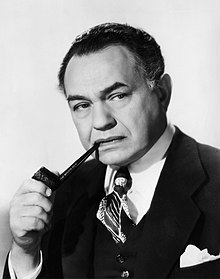
Back Edward G. Robinson Afrikaans Edward G. Robinson AN إدوارد روبنسون Arabic ادوارد ج. روبنسون ARZ Edward G. Robinson AST Edvard Q. Robinson Azerbaijani ادوارد جی. رابینسون AZB Едуард Робинсън Bulgarian এডওয়ার্ড জি. রবিনসন Bengali/Bangla Edward G. Robinson Catalan
Edward G. Robinson | |
|---|---|
 Robinson in 1948 | |
| Born | Emanuel Goldenberg December 12, 1893 |
| Died | January 26, 1973 (aged 79) Los Angeles, California, U.S. |
| Resting place | Beth El Cemetery, Ridgewood, Queens |
| Nationality | American |
| Occupation | Actor |
| Years active | 1913–1973 |
| Spouses | Gladys Lloyd
(m. 1927; div. 1956)Jane Robinson (m. 1958) |
| Children | Edward G. Robinson Jr. |
| Awards | |
Edward G. Robinson (born Emanuel Goldenberg; December 12, 1893 – January 26, 1973) was an American actor of stage and screen, who was popular during Hollywood's Golden Age. He appeared in 30 Broadway plays,[1] and more than 100 films, during a 50-year career,[2] and is best remembered for his tough-guy roles as gangsters in such films as Little Caesar and Key Largo. During his career, Robinson received the Cannes Film Festival Award for Best Actor for his performance in House of Strangers.
During the 1930s and 1940s, Robinson was an outspoken public critic of fascism and Nazism, which were growing in strength in Europe in the years which led up to World War II. His activism included contributing over $250,000 to more than 850 organizations that were involved in war relief, along with contributions to cultural, educational, and religious groups. During the 1950s, he was called to testify in front of the House Un-American Activities Committee during the Red Scare, but he was cleared of any deliberate Communist involvement when he claimed that he was "duped" by several people whom he named (including screenwriter Dalton Trumbo), according to the official Congressional record, "Communist infiltration of the Hollywood motion-picture industry".[3][4] As a result of being investigated, he found himself on Hollywood's graylist, people who were on the Hollywood blacklist maintained by the major studios, but could find work at minor film studios on what was called Poverty Row.
Robinson's roles included an insurance investigator in the film noir Double Indemnity, Dathan (the adversary of Moses) in The Ten Commandments, and his final performance in the science-fiction story Soylent Green.[5] Robinson received an Academy Honorary Award for his work in the film industry, which was awarded two months after he died in 1973. He is ranked number 24 in the American Film Institute's list of the 25 greatest male stars of Classic American cinema. Multiple film critics and media outlets have cited him as one of the best actors never to have received an Academy Award nomination.[6][7]
- ^ "Edward G. Robinson – Broadway Cast & Staff | IBDB". IBDB. Retrieved April 10, 2020.
- ^ Cite error: The named reference
NYTwas invoked but never defined (see the help page). - ^ "Communist infiltration of Hollywood motion-picture industry : Hearing before the Committee on Un-American activities, House of Representatives, Eighty-second Congress, first session". 1951.
- ^ "Actor Edward G. Robinson Confesses to HUAC — "I Was a Sucker"". Today in Civil Liberties History. March 12, 2016. Retrieved April 30, 2021.
- ^ Obituary Variety, January 31, 1973, p. 71.
- ^ Robey, Tim (February 1, 2016). "20 great actors who've never been nominated for an Oscar". The Daily Telegraph. Archived from the original on January 11, 2022. Retrieved October 17, 2022.
- ^ Singer, Leigh (February 19, 2009). "Oscars: the best actors never to have been nominated". The Guardian. UK. Retrieved September 17, 2022.